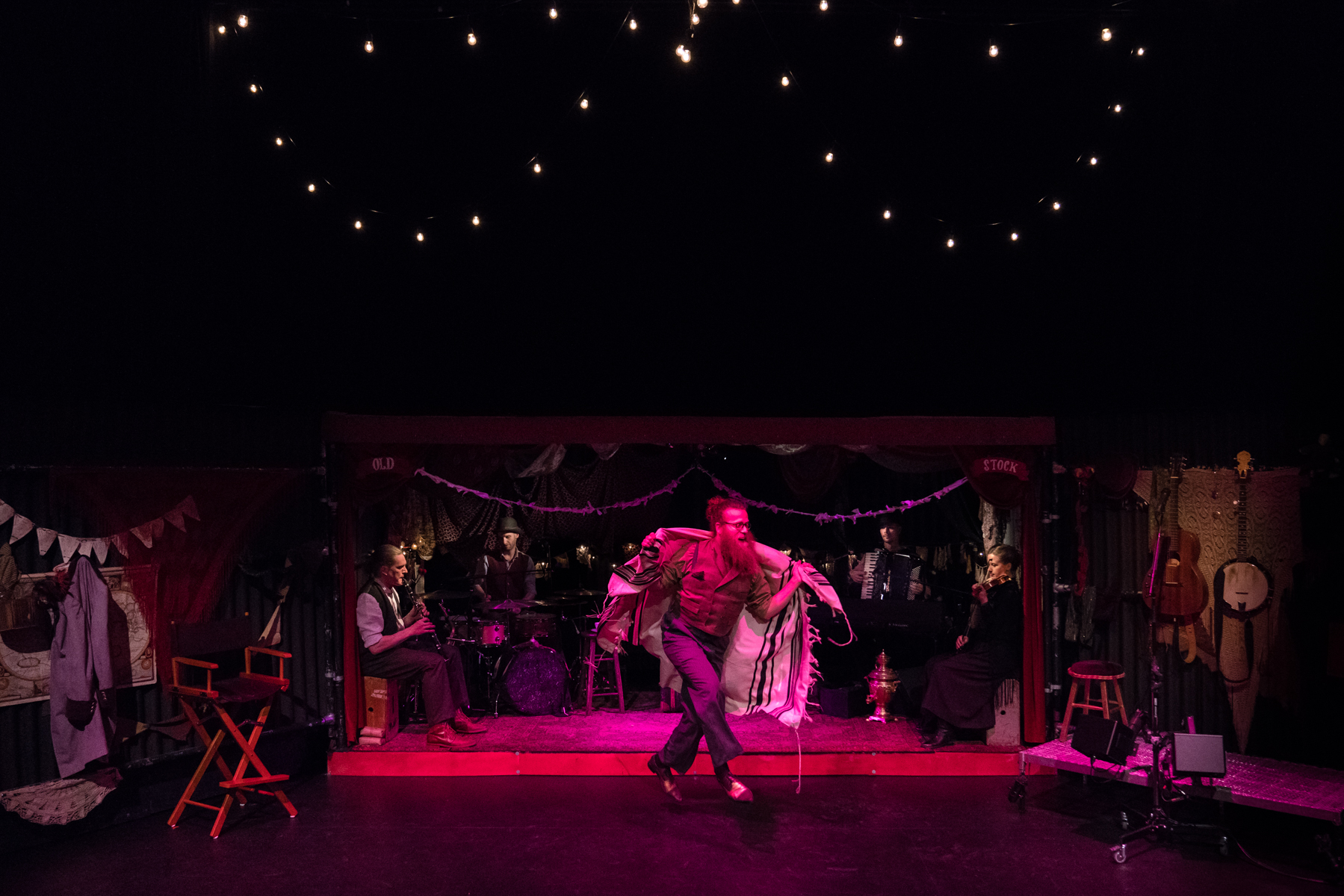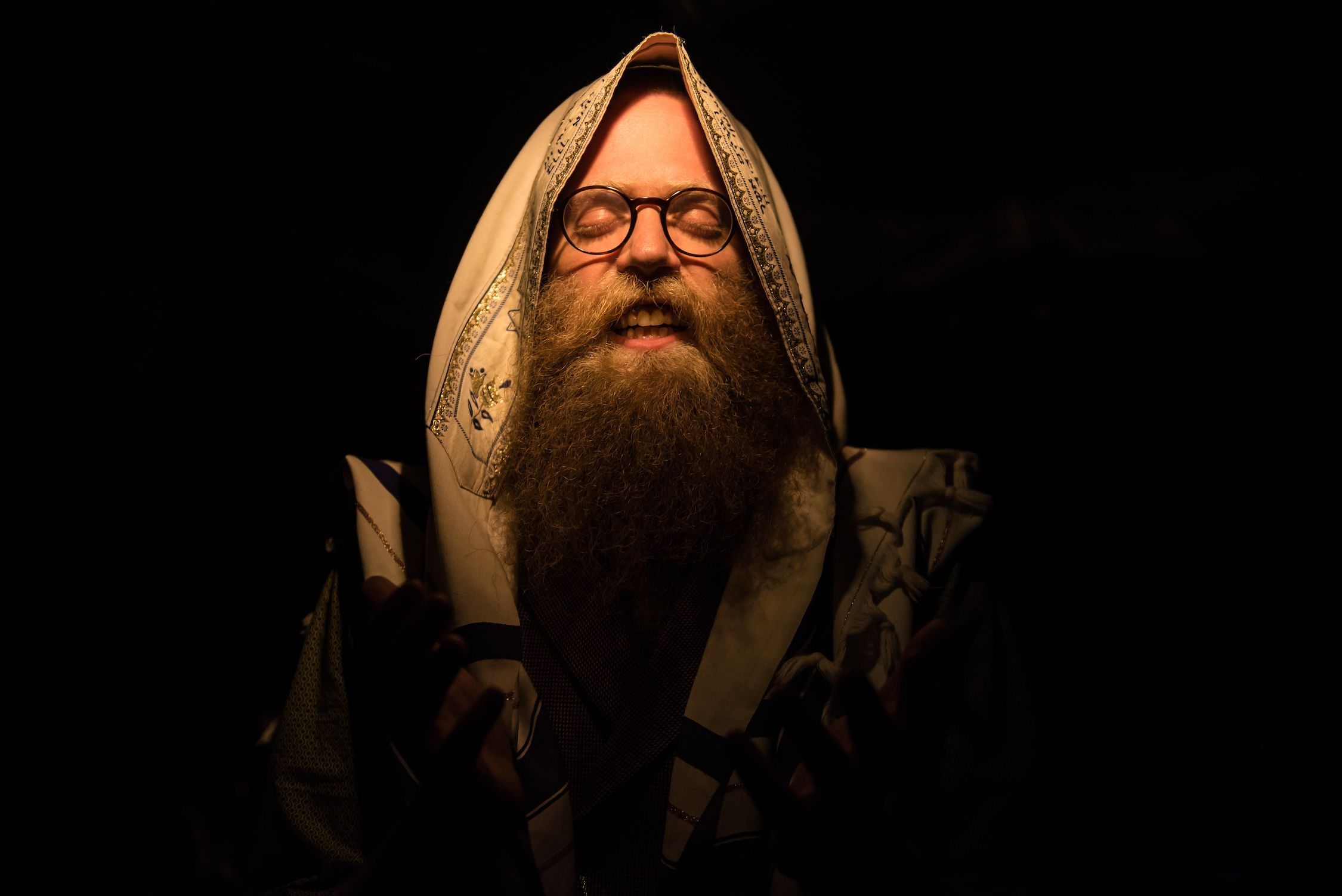
“This is not a story about a long time ago, but about now” says a PuSh Festival presenter. This is the perfect way to describe 2B Theatre’s “Old Stock: A Refugee Love Story”. The show is set in 1908 but its themes are just as relevant today. Hannah Moscovitch’s script follows the lives of two real-life Jewish Romanian refugees landing in Canada. Chaim and Chaya meet for the first time at Pier 21 in Halifax Harbour, waiting to be processed. Later they meet again in Montréal and marry, adapting to Canadian life, and trying to move on from the horrors of their past, together.
“Old Stock” is also a live concert, peppered with stand up comedy. The Wanderer (Ben Caplan), transitions seamlessly between speech and song throughout the dark, comic tale. The mood switches suddenly from hilarious to heartbreaking to horrifying and back again. As the audience filed in on opening night, we saw a shipping container onstage, lit in pink. String lights hung over the stage and the audience. Written on the container were strings of numbers, and the word “Tehva”, meaning “life” in Hebrew. Upbeat European folk-style music played as people found their seats.

“Old Stock” holds the audience’s attention from the first moment the house lights go down and a spotlight shines on Caplan popping out of the top of the shipping container in a velvet top hat and long coat, feathers in his lapel. He sings, engulfed in smoke, while two musicians swing open the front panels of the container to reveal the rest of the set. Four musicians sit inside, with a small side stage for The Wanderer. Props, instruments, and colorful cloth and shawls hang on every wall. All five performers remain on stage the entire show, having everything they need integrated in the set. The lighting is simple, red or blue washes, or spotlights highlighting characters expressions. The two musicians who opened the doors turn out to be our heroes, Chaim Moscovitch (Eric Da Costa) and Chaya Yancovitch (Shaina Silver-Baird). They slip back and forth between their seats in the band, and the center of the container, where the action of the story takes place.

Da Costa has an easy quality about him, playing the young Chaim as excitable and sincere. Silver-Baird’s Chaya is confident and aloof, rarely saying exactly what she means. The narrator (The Wanderer) has the air of a circus ringmaster, breaking the fourth wall, guiding the audience through the story, and singing many things that the characters leave unsaid. Caplan’s original music blends Yiddish klezmer with modern folk stylings, his voice reminiscent of Tom Waits. He fully embodies his character throughout the show, pulling the audience along wherever he goes.
He, too, is a refugee, as he states in the song The Traveller’s Curse “I have been libelled as a wanderer; This is not the case; I have a home, it’s just that; It’s an inconvenient place right now”. As Chaim and Chaya adjust to their new lives we witness how they each approach a situation. On their wedding night he is nervous, kissing her quickly then backing away. She moves in and kisses him passionately, letting her emotions show for the first time. The Wanderer drinks and dances and celebrates their marriage, but asks “Can these people be happy? They’re so outta practice.”

These intimate moments between the couple are intertwined with emotional musical sequences, such as a scene in which “old stock” Canadians fear being overrun by the “semitic hoards”. The Wanderer yells into a bullhorn, sirens blare, red lights flash, and Chaim experiences a horrific flashback to the pogrom that killed his family. This fades into soft blue light and piano music as Chaya rocks her baby to sleep. We witness all of their lives together, the good and the bad, the terrifying and the joyful. United first by mutual trauma, then by the life they bring into the world, they are stronger together. Both Chaim and Chaya retain their faith despite their suffering—when tragedy strikes they pray, turning toward God rather than away.
“Old Stock” is brilliant and depressing, rage-inducing and heartbreaking, and in the end, hopeful. We are reminded that this story is not just about these two people who survive. “Others were not so lucky. Others are not so lucky.” As the performers bow and dance to boisterous folk-music and the audience rises from their seats, the person sitting behind me repeats “Wow! Oh my god, wow!” over and over. I feel exactly the same way.

Check out “Old Stock” and the PuSh Festival here.
– Kristen Lawson
